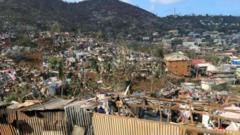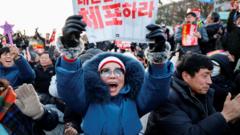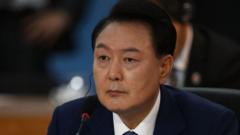**With a significant win amid economic turmoil, Mahama looks to address pressing issues as he returns to leadership.**
**Triumphant Return: John Mahama Clinches Ghana's Presidency Again**

**Triumphant Return: John Mahama Clinches Ghana's Presidency Again**
**Former President John Mahama secures victory in Ghana's recent elections, igniting a wave of celebration among supporters.**
Ghana’s recent presidential election has concluded with former President John Mahama of the National Democratic Congress (NDC) emerging victorious, affirming his political comeback with 56.5% of the vote against Vice-President Mahamudu Bawumia's 41.6%. The official confirmation was drawn from results across all 16 regions, leading to jubilant celebrations among Mahama’s supporters nationwide.
The election unfolded against a backdrop of severe economic hardship, marked by high unemployment rates, surging living costs, and environmental issues stemming from illegal gold mining practices—referred to as "galamsey." These circumstances significantly influenced the electorate's desire for change, resulting in Mahama’s victories in several regions that were previously dominated by the ruling New Patriotic Party (NPP) during the 2020 elections. Notably, results from the Ashanti region—historically an NPP stronghold—remain unconfirmed.
In his concession shortly after the polls, Bawumia recognized the need to mitigate unrest and honor the electoral process, ensuring a peaceful transition. Following this, large gatherings erupted across the country, characterized by flag-waving and horn-blowing celebrations, particularly in major cities like Kumasi, where citizens expressed hope for improved job prospects and stabilized prices.
While Mahama’s return marks a critical shift in a politically dynamic landscape, his previous presidency (2012-2017) was marred by economic strain, energy crises, and corruption accusations. Nevertheless, this latest victory is viewed as an opportunity for revitalization. Promises from Mahama’s campaign to transition Ghana into a vibrant "24-hour economy" have sparked cautious optimism among the populace.
As the official swearing-in is scheduled for 7 January 2025, Mahama's leadership will be closely scrutinized as Ghana continues to grapple with pressing socio-economic issues. This election also signifies a notable trend across Africa, marking Ghana as the fifth nation this year to witness an opposition triumph, reflecting broader shifts within the continent's political climate.
The election unfolded against a backdrop of severe economic hardship, marked by high unemployment rates, surging living costs, and environmental issues stemming from illegal gold mining practices—referred to as "galamsey." These circumstances significantly influenced the electorate's desire for change, resulting in Mahama’s victories in several regions that were previously dominated by the ruling New Patriotic Party (NPP) during the 2020 elections. Notably, results from the Ashanti region—historically an NPP stronghold—remain unconfirmed.
In his concession shortly after the polls, Bawumia recognized the need to mitigate unrest and honor the electoral process, ensuring a peaceful transition. Following this, large gatherings erupted across the country, characterized by flag-waving and horn-blowing celebrations, particularly in major cities like Kumasi, where citizens expressed hope for improved job prospects and stabilized prices.
While Mahama’s return marks a critical shift in a politically dynamic landscape, his previous presidency (2012-2017) was marred by economic strain, energy crises, and corruption accusations. Nevertheless, this latest victory is viewed as an opportunity for revitalization. Promises from Mahama’s campaign to transition Ghana into a vibrant "24-hour economy" have sparked cautious optimism among the populace.
As the official swearing-in is scheduled for 7 January 2025, Mahama's leadership will be closely scrutinized as Ghana continues to grapple with pressing socio-economic issues. This election also signifies a notable trend across Africa, marking Ghana as the fifth nation this year to witness an opposition triumph, reflecting broader shifts within the continent's political climate.





















